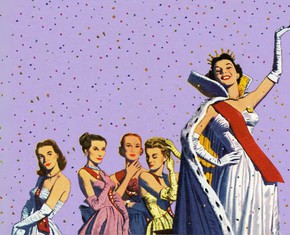The views expressed in our content reflect individual perspectives and do not represent the authoritative views of the Baha'i Faith.
When was the last time you felt like you had to cut someone out of your life? What did they do that pushed you to the point of removing yourself from the relationship?
Whether we realize it or not, the culture we live in shapes many of our personal decisions and thoughts. In the spaces and communities I am a part of, I’ve noticed that many of us tend to react to situations by “cutting people off.”
Our generation watched many of our parents divorce, separate, or break up when things became hard, rather than silently suffer through toxic relationships like their parents often had. Social justice movements that push for gender equity, black liberation, and equal opportunities for immigrants reflect many peoples’ longing for freedom from unhealthy forces that inhibit joy. Many people in my circles have a passion for freedom and desire to protect and distance themselves from those who bring us harm.
These movements are necessary for our growth as a society. An increase in consciousness means that we have increased our capacity to create a healthier and safer society. The Baha’i teachings say:
Reflect a while, and consider how they who are the loved ones of God must conduct themselves, and to what heights they must soar. – Baha’u’llah, Gleanings from the Writings of Baha’u’llah, p. 243.
With the valuable and the newly strengthened ability to identify toxicity and our fervent desire to remove it from our lives, it comes as no surprise that we apply this ability to many realms of our life. Our desire to be far from toxicity can spill into the desire to be far from anything that makes us uncomfortable.
Despite its usefulness in some realms of our lives, when we are trapped in the world of criticism or when cutting people off becomes the only tool we know to use, things can become a little tricky. Our friendships, familial relationships and romantic relationships naturally see themselves affected by the wider culture of our generation. When we turn an overly critical eye to individual people in our lives, we can easily find tons of imperfections. When we pay too close attention to those imperfections, we might catch ourselves feeling that it is very difficult to find people worthy of our affection and company.
However – the Baha’i writings encourage us to overlook the shortcomings of others. We can do this effectively by remembering our own flaws:
If the fire of self overcome you, remember your own faults and not the faults of My creatures, inasmuch as every one of you knoweth his own self better than he knoweth others. – Baha’u’llah, The Hidden Words, p. 45.
Another advantage seeing the good in others offers is the ability to avoid extra pain. Sometimes it hurts us when we throw friends away left and right, cut off family members for any reason, or completely disappear from the lives of any person we’ve been romantically interested in when it doesn’t work out. We often don’t see people holistically, forgetting that people have value beyond simply fitting the role we’ve assigned them in our lives. It also doesn’t feel great or fair to constantly feel at risk of possibly being dropped forever. We all hope that people will see the good in us when we struggle through hard times and stick through those times with us rather than abandon ship. It feels backwards to toss people out as if they can be easily replaced. We recognize our own uniqueness, so to ignore it in others is contradictory:
And if thine eyes be turned towards justice, choose thou for thy neighbor that which thou choosest for thyself. – Baha’u’llah, Epistle to the Son of the Wolf, p. 30.
If we don’t recognize when others influence us in a toxic way, we can find ourselves following in the footsteps of people leading us astray. While avoiding a black-and-white mentality (where people are either in our life or out of it), we can also avoid unhealthy influences on our spiritual wellness:
Beware! Walk not with the ungodly and seek not fellowship with him, for such companionship turneth the radiance of the heart into infernal fire. – Baha’u’llah, The Hidden Words, p. 42.
The company of the ungodly increaseth sorrow, whilst fellowship with the righteous cleanseth the rust from off the heart. – Ibid.
In order to avoid falling into the simplistic mindset that any person who poses a challenge in our life is ‘ungodly,’ however, we might need to re-conceptualize our understanding of what ‘ungodly’ means. Maybe our interactions or lack of healthy boundaries create toxicity between us and the people around us. Once we can define the source of the problem, we can manage the role we play in relationships and adjust accordingly, rather than always treating people as if they are disposable.
















Comments
Sign in or create an account
Continue with Googleor